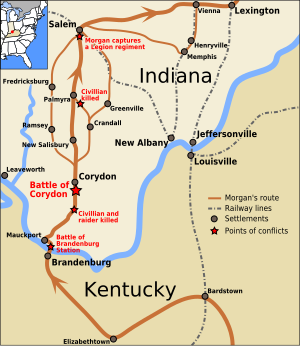Battle of Corydon
| Battle of Corydon | |||||||
|---|---|---|---|---|---|---|---|
| Part of the American Civil War | |||||||
 Map showing Morgan's Raid in the Harrison and Washington County area, and the location of the battle. |
|||||||
|
|||||||
| Belligerents | |||||||
|
|
|
||||||
| Commanders and leaders | |||||||
| John Hunt Morgan |
Edward H. Hobson Lewis Jordan |
||||||
| Units involved | |||||||
| Morgan's Cavalry Division | Indiana Legion | ||||||
| Strength | |||||||
| 1,800 4 artillery pieces |
400 | ||||||
| Casualties and losses | |||||||
| 11 killed1 40 wounded3 |
4 killed2 10–12 wounded 355 captured |
||||||
|
1One additional Confederate was killed by a civilian before the battle began 2Three civilians were killed by Confederates. Two Legion defenders were also killed during the crossing of the Ohio River the day before the battle. 3One Confederate was wounded during the crossing of the Ohio River |
|||||||
1One additional Confederate was killed by a civilian before the battle began 2Three civilians were killed by Confederates. Two Legion defenders were also killed during the crossing of the Ohio River the day before the battle.
The Battle of Corydon was a minor engagement that took place July 9, 1863, just south of Corydon, which had been the original capital of Indiana until 1825, and was the county seat of Harrison County. The attack occurred during Morgan's Raid in the American Civil War as a force of 2,500 cavalry invaded the North in support of the Tullahoma Campaign. It was the only pitched battle of the Civil War that occurred in Indiana, and no battle has occurred within Indiana since.
As news of an impending raid spread across the state, Governor Oliver P. Morton called out the state's militia force, the Indiana Legion, to defend against the threat. Unaware of the size of the invading army, four companies of the 6th and 8th Regiments of the Legion, totaling about one hundred men, attempted to prevent the Confederates from crossing the Ohio River into Indiana, but were overcome by superior artillery fire, killing two of the defenders. The units retreated northward where they met with the main body of the 6th Regiment under the command of Col. Lewis Jordan. Along with the townspeople, they constructed breastworks that formed a defensive line south of Corydon. Despite promises of reinforcements from regional Legion commanders in New Albany, only about 450 men (consisting almost entirely of locals) were defending the town.
...
Wikipedia
